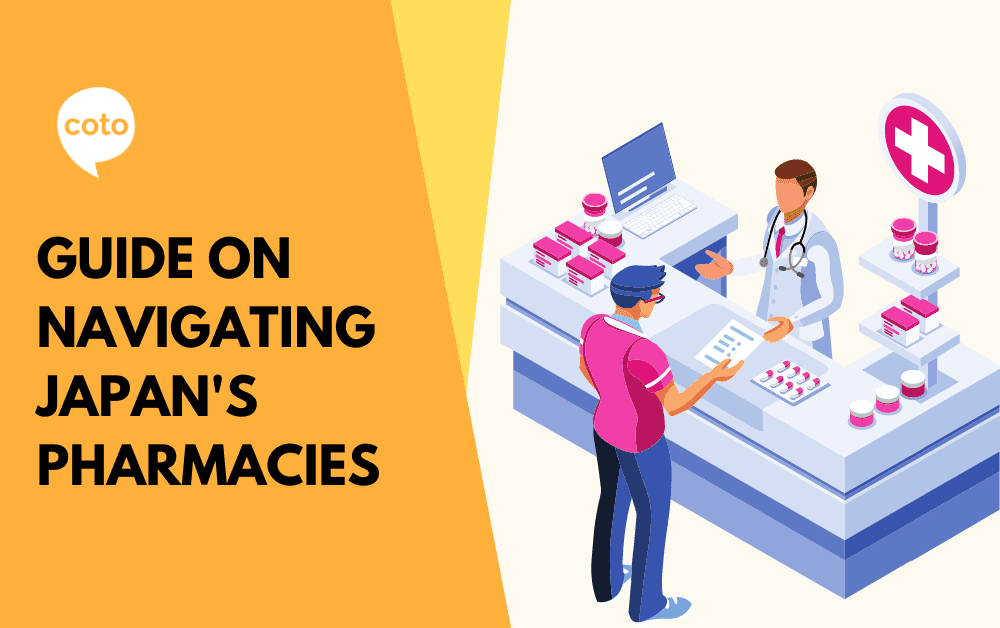Whether you’re a seasoned resident of Japan or just visiting for a short stay, knowing your way around a pharmacy can be invaluable. Unlike many Western countries, pharmacies in Japan are categorized into two distinct types: drugstores and 薬局 yakkyoku. This guide will walk you to different places to get medicines and the vocabulary and phrases you can use.
A Quick Jump To…
- 調剤薬局 Drugstores
- 薬局 Yakkyoku
- Commonly Bought Medications
- Common Phrases for Japanese Pharmacies
- Additional Tips
- FAQ
調剤薬局 Drugstores
These are the most common type of pharmacy and sell a wide variety of products, including cosmetics, toiletries, household items, and even food. They are usually open longer hours, often staying open until late in the evening. Popular drugstore chains in Japan include Matsumoto Kiyoshi, Cocokara Fine, and Sun Drug.
Matsumoto Kiyoshi
Location: Use this to find the nearest location to you
Opening Hours: Monday to Sunday, 9:00 – 21:00 (varies by location)
Cocokara Fine
Location: Use this to find the nearest location to you
Opening Hours: 10:00 – 22:00 (varies by location)
Sun Drug
Location: Use this to find the nearest location to you
Opening Hours: 10:00 – 20:00 (varies by location)
薬局 Yakkyoku
These pharmacies focus solely on the sale of medication and typically have more limited hours than drugstores. They are usually located near hospitals or clinics. To purchase any medication here, you are required to provide a doctor’s prescription. However, some do not fill foreign prescriptions, so make sure to keep in mind that.
Commonly Bought Medications
- Pain relievers: ロキソニン (Roki-sonin), バファリン (Bufferin)
- Cold and flu remedies: パブロン (Paburon), コンタック (Kontaku)
- Allergy medications: アレジオン (Allergic), クラリチン (Claritin)
- Digestive aids: キャベジン (Cabein), 正露丸 (Seirogan)
- Eye drops: ロート (Rohto), サンテ (Sante)
You can also buy a number of other items at a Japanese pharmacy, such as:
- Bandages and other first-aid supplies
- Sunscreen and other skin care products
- Feminine hygiene products
- Vitamins and supplements
- Cosmetics
| 鎮痛剤 | Chintsū-zai | Pain relievers |
| 風邪・インフルエンザ治療薬 | Kaze infuruenza chiryō-yaku | Cold and flu remedies |
| アレルギー治療薬 | Arerugī chiryō-yaku | Allergy medications |
| 胃腸薬 | Ichō kusuri | Digestive aids |
| 目薬 | Megusuri | Eye drops |
| 包帯 | Hōtai | Bandages |
| 救急用品 | Kyūkyū yōhin | first-aid supplies |
| 日焼け止め | Hiyakedome | Sunscreen |
| スキンケア | Sukin kea | skin care products |
| 生理用品 | Seiri yōhin | Feminine hygiene products |
| ビタミン | Bitamin | Vitamins |
| 化粧品 | Keshōhin | Cosmetics |
Common Phrases for Japanese Pharmacies
- 〇〇薬をください。〇〇 Kusuri o kudasai. – I would like some 〇〇 medicine.
- 何日分になりますか。Nan’nichibun ni narimasu ka. – How many days’ worth is this?
- 痛みがあります。Itami ga arimasu. – I have pain.
- 熱があります。Netsu ga arimasu. – I have a fever.
- 風邪を引きました。Kaze o hikimashita. – I got a cold.
- 咳が出ます。Seki ga demasu. – I do cough.
- 喉が痛いです。Nodogaitaidesu. – My throat hurts.
- 腹痛がします。Fukutsū ga shimasu. – I have a stomachache.
- アレルギーがあります。Arerugī ga arimasu. – I have allergies.
- おすすめはありますか。Osusume wa arimasu ka. – Do you have any recommendations?
- 副作用はありますか。Fukusayō wa arimasu ka? – Are there any side effects?
Additional Tips
- Bring your passport or other form of identification with you.
- Be prepared to pay in cash, as not all pharmacies accept credit cards.
- If you are unsure about a medication, ask the pharmacist for help.
- Be sure to read the label carefully before taking any medication.
- By following these tips and learning some basic Japanese phrases, you can easily navigate Japan’s pharmacies and ensure you get the medication you need.
You Might Be Wondering…
What medications can I buy without a prescription?
A wide range of over-the-counter medications are available, including pain relievers, cold and flu remedies, allergy medications, and digestive aids. Be sure to speak to a pharmacist if you have any questions or concerns about taking medication.
What are the typical opening hours of pharmacies?
- Drugstores: 9:00 am – 8:00 pm
- Yakkyoku: 9:00 am – 6:00 pm
- Most pharmacies are closed on Sundays and holidays.
Can I use my foreign insurance at a Japanese pharmacy?
- Unfortunately, most foreign insurance plans are not accepted in Japan. You will be required to pay for your medication out of pocket.
Do any pharmacies have English-speaking staff?
Some pharmacies, especially those located in tourist areas, may have English-speaking staff. Carrying a translation app or phrasebook with you is always a good idea.
